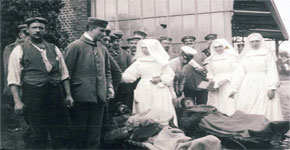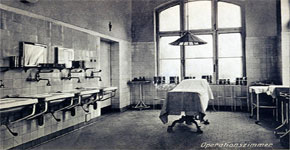
SERVICE DURING WORLD WAR
[Translation of an article found in the Souvenir published by our sisters on the occasion of the 125 year jubilee of the St. Joseph’s hospital at St. Vith, Belgium.]
The First World War brought new areas of apostolate for sisters of our congregation however, it does not give happy memories. The number of soldiers to take care during 1914 to 1918 was very large in comparison with the First world war 1868 to 1870. All the Government clinics were converted and reserved for Lazarett (military hospital). The Augusta Hospital was totally used for military purpose. We took severely injured British and French soldiers as patients already by end of 1914 itself. Also in the branch hospital in Luetzowel Street (which was given by the Jewish community of Cologne) our sisters worked for soldiers who had trouble with their pulmonary system. This was a voluntary service and the expenses were met by the congregation
Our hospitals fully or partially owned by us were converted into Lazarett. St. Agatha Hospital which was almost new was fully taken over by the Maltese unit for the same purpose. Our Mother house during the years of great starvation up to the year 1914 took care of 40 to 50 children with its own means. Some part of the Mother house as well as the hospital were used to care for the wounded soldiers. As food was very rare and hard to get due to prolonged war, mother house supplied daily for 30 families their Midday meal. Mother house as well as the houses nearby took care of soldiers with food, medicine and other necessary needs free of cost. St. Antonius Hospital in Bayenthal, Cologne was converted into a reserve hospital. At times of need the common folks too showed their solidarity. Once it happened that in one night alone 150 wounded soldiers were brought into already an overfilled hospital. The people around came to know about it and brought the necessary bed linen and clothes in the same night to support the sisters and to help the suffering soldiers.
It is noted that all the sisters and students of Home science school stood at the road side of south Cologne to give to the returning soldiers soup, bread and drinks and this they did it for a week long. Our Sisters in St. Joseph’s Hospital in St.Vith experienced the might of the war very closely. Germans began attacking the free Belgium District in Eupen and Malmedy. Our sisters not only took care of the wounded soldiers in Lazarett. Besides the medical needs were met of more than 1000 Russian prisoners of war who were put in forced labor to lay the railway lines in Eifel. They were given all what they needed especially during the hard winter season. Towards the end of the war in 1918 a virus epidemic which was brought in by the returning soldiers became fatal for many of the already sick soldiers. Also the last batch of returning soldiers brought a contagious small pox. The sisters and the civilians who were kept sheltered in isolation in the convent were cared by doctor Sege who came voluntarily from the University of Cologne. Also he resided with the patients. He survived but three of our sisters and two ladies from St.Vith lost life due to the epidemy.
Service in the Lazarett Trains.
As our sisters were working in cologne the sisters and students in Grosskönigsdorf also took care of the soldiers who were coming back from the battle field by train. In the same way sisters working in the Major Seminary of cologne rendered their service at the cologne central Station which was also close by. Those injured soldiers who came in daily with the lazarett trains were attended to with food clothing and medicines.
Two of such trains equipped fully as rolling Hospital were managed by our sister. One train had 25 bogies with 278 beds. In addition it had 7 bogies extra to use as operation theater, Kitchen, provision room, luggage room, Chapel and accommodation for sisters. A total of 78 trips were made till the end of 1918. 19 Sisters and 18 Health workers were engaged in this special mission. Soldiers of all Nationalities were taken in at the stations where the train stopped. Civilians were also cared for where ever there was necessity and this was the condition everywhere. Sr.Callista Thiele writes about their 12th trip in 1914 which had a stop in a deserted place of the war front. “With me there were three injured Soldiers from France and three from Bayern in the Operation room. In the small railway station as we took in the French soldiers a women came up to the wagon. As they saw how well we (Germans) treated them with kindness even the enemy she ran to her house and brought me flowers and were thanking me profusely”
On our 19th trip we came to Blanc (one of the battle field) mission and stayed there till 13th Sept. Sundays we attended Holy Mass in the parish church. The parish priest was a very holy priest who gave all what he had to the poor. On our invitation he came to visit us in the lazarett train. The Baron gave him rich presents as half of his village was burned down and only the broken walls were standing. They had no doctor or medical help in that area. Dr. Winmer was very kind to the poor sick people so he made home visits to them and I accompanied him with a medical kit. Often we had to go right to the center of war zone especially during the end of the war years. Although it was a very risky ministry and mission due to continuous air attack we went to the neutral zone a few times where the wounded foreign soldiers were exchanged with germen prisoners of war. Mother house alone took care of more than 5000 soldiers who were injured or sick.
The second train had 30 compartments like the other one Already by the third trip during the middle of November the train derailed. One of our sisters lost her life coming under the crushed compartment which was the operation theater. The other train also had a serious accident. On 4th October 1917 at 3 am it was hit by another train carrying ammunitions. The chapel and the compartment accommodating the sisters were completely destroyed due to explosion of ammunitions. By noon the last sister was taken out and it made us to realize that 5 of our sisters Sr. Eustella Reuter, Sr. Potentina Link, Sr .Silvana Ploetzer, Sr. Adjutta Nettesheim, Sr. Josetta Stuerz lost their lives and many others survived with serious injuries. Those five sisters were buried with great military honor in the presence of high ranking officers. In commemoration of all the heroic service rendered during the war a Monument is placed in the courtyard of motherhouse cologne. Another Monument is placed in the village (today town) St. Severine with the inscription “In memmorium Charitatis 1914 to 1917.”



